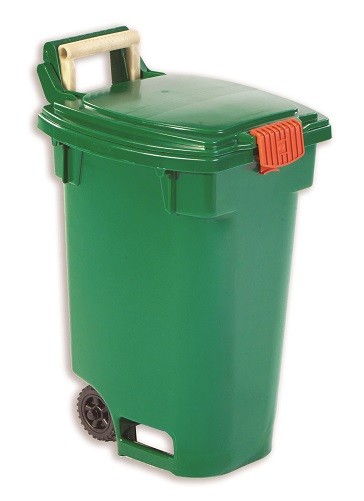The continuing evolution of food waste recycling
ORBIS’ John Sebranek talks to Recycling Product News about the “yuck factor”, education at the source and the future of organics collection in North America

In 2009, ORBIS Corporation purchased Norseman Environmental Products, the original large-scale distributor and manufacturer of the Earth Machine backyard composter and an experienced Canadian based manufacturer and supplier of recycling bins, organic waste carts and bins, dumpsters, rain barrels and accessories. The now familiar Earth Machine backyard composter currently boasts over 2.5 million units in use, in more than 3,500 communities worldwide.
John Sebranek is ORBIS Corporation’s marketing manager for environmental. He recalls that it was really the Earth Machine product line that secured Norseman’s place in the organic waste category. “From there, when Norseman began their partnership with the City of Toronto, around 2002, they helped develop what was the first large-scale food scrap collection program in North America, with the introduction of the Green Bin and the Kitchen Collector line. This is basically how Norseman got involved so heavily in curbside food scrap collection.”
Today, Sebranek says, while the largest part of ORBIS’ business is in returnable, reusable packaging, and in the manufacture of plastic products such as pallets for industrial and automotive industries, they do a growing amount of business in “blue” and other curbside recycling bins, and particularly in organic waste collection products, with both curbside and kitchen food scrap collection containers.
“With the majority of our organics programs, basically we’re providing both the kitchen collector and a curbside container,” explains Sebranek. “We’ve found that most municipalities that incorporate not only the curbside organics container but also a small kitchen container, get higher participation rates.” “We do quite a bit of business in Canada. The conventional wisdom is whatever you do in the U.S., you do 10 percent of that in Canada. Just based on population. But we do quite a bit more than that in Canada, mainly because the country overall is more advanced than the U.S. when it comes to organic waste collection programs.”
Sebranek says ORBIS has supplied various cities in Canada with curbside and in-home collection systems for their organics and other recyclables programs, including Ottawa, Nanaimo, B.C., and in Quebec, mainly in the Montreal area.
The right organics container – key to getting over the ‘yuck’ factor
One of the biggest hurdles Sebranek has seen in his time at ORBIS with respect to implementing organic waste collection programs and achieving high participation rates, is the ‘yuck’ factor. Food waste is often wet and gives off odour, so a traditional response is to just not want to deal with it.
“What we’ve done to address this challenge is with the development of our Kitchen Collector line: it does a very good job of trapping in odours, so you don’t have the smell of rotting food in your kitchen.” (Sebranek says to fully avoid odours, they recommend that a kitchen container is emptied at least every three to four days.)
“Our latest design does an even better job than our older models to trap odours in,” he says. “We’ve enhanced our kitchen collector’s double-sealed rim, so there’s even more of a rim on the outside. “One other factor that is a little bit different from our competitor’s products is that we designed our kitchen collector to be large enough to accommodate the width of traditional dinner plate, which is anywhere from 10 to 12 inches, to be scraped easily into it. This makes things less messy.”
ORBIS’ kitchen collector also has an updated inside rim and features a lid-stop at 90 degrees and one at 270 degrees.
“The great thing about this is that if you don’t use a liner in your bin, and you are emptying it by flipping it over and dumping into your green bin or backyard compost, you don’t have to worry about the lid flopping closed and slopping food waste. We just try and make it a cleaner, easier process for everybody using our product.”
With respect to the recent trend in vented lids, Sebranek says they have the option, but that he’s not a big proponent of it.
“You don’t get a whole lot of evaporation of moisture to justify a vented lid, if you are emptying every three or four days,” says Sebranek. “And you get more odour seeping out.”
On their Green Bin curbside cart line, there are similar challenges with minimizing mess and odours. Sebranek says ORBIS was the first to design an organics collection cart that is fully self-contained, with no protrusions, no openings, venting or holes in the bin.
“When you’re flipping an organics cart over and all the food scraps and moisture are coming out, with venting and holes it can be messy. By having a fully-contained container, it reduces the amount of exposure to the food scraps, and spillage onto the outside of the cart.”
The other development designed to make ORBIS’ line of organics containers more user-friendly is the recently introduced optional telescopic handle for both the Green Bin and Kitchen Collector. “This has been very well received,” Sebranek says. “On the smaller Green Bins as well. The new, more aggressive latch is designed to be more difficult for an animal to open. For more aggressive pests, such as racoons, like they have so many of in the Toronto area, we have a secondary lock option that can be inserted into the container. It requires users to push up and pull out at the same time. These two motions at once make it much more challenging for a racoon to get in.”
Education is key
With respect to education of communities on the importance of organics recycling, Sebranek says municipalities usually take the driver’s seat, with their support. “Honestly, it’s more important in the U.S market where organics recycling is not as well entrenched. Not as many people are aware of food scrap separation and collection. “The key is getting the word out using as many different media as possible, communicating up front with residents, letting them know a program is coming to their community well ahead of time. And making them aware of why the program is being put in place. “It’s alright to over-communicate, to make sure the word gets out. By establishing communication with residents, it can help them overcome objections and concerns, and at least the city can then address those concerns if possible, and be able to do it in an open and honest way.”
“The conventional wisdom is that whatever business you do in the U.S., you do about 10 percent of that in Canada. Just based on population. We do more than that, mainly because Canada overall is more advanced than the U.S. when it comes to organic waste collection programs.” John Sebranek, ORBIS
Collecting organics for the future
According to Sebranek, organics recycling has come a long way in the last decade, but it’s a relatively slowpaced evolution. “I liken the organics recycling movement to where we were with recycling 35 years ago. Back then, alot of people were resistant to the advent of recycling programs for paper and plastic and aluminum cans. Today, if I’m out in public with an aluminum can and I don’t see a recycling bin to throw it in, I feel a little guilty. I don’t know what to do with it.”
“This same change of mindset is starting to happen in Canada with respect to organics recycling,” continues Sebranek. “I think it’s going to continue to spread in Canada and in the U.S., as we look for ways to really save or extend landfill life and reduce our greenhouse gases. Methane from landfills is one the main contributors to greenhouse gas emissions. If organic scrap currently occupy somewhere around 50 percent of material in a landfill, and we can eliminate almost half of that by pulling out food scraps, that’s a great thing. It is the answer to achieving significantly higher rates of diversion of waste from landfill.”
And the key to changing the overall mindset of North Americans, so organics recycling can continue to move forward?
“It’s primarily a matter of municipalities being on board with organics recycling. As more and more communities get comfortable with it, and the word gets out – and the word does get out when you see the successes in cities like Toronto – everyone becomes more comfortable with it, and more communities decide to make the switch.
“In so many cases it comes down to economics or a landfill space concern. This is in part what happened in Toronto. And now with food waste bans such as those going on in both British Columbia and Quebec, we’re starting to see this occur more and more, it starts to build up support and the demand for compost processors. As soon as you start to have the processing facilities in place, that’s when things start to take off at the government level. Until you have a place to process, organics recycling is a challenge. It’s one of those things; if you build it, they will come.”
On the other hand, the right legislation is needed to help in terms of setting up a marketplace that can handle compost processing or food scrap processing.
With respect to food waste bans in the U.S. similar to those that have begun in Canada, Sebranek says it’s starting to happen. “You’re starting to see it in the Northeast especially where I would say it is driven by economics. Where landfill costs and tipping fees are more expensive in certain areas or if landfill space is filling up. These are the first communities to take the leap – where you see the food scrap bans from landfill. Honestly, I think it’s happening as fast as municipalities and states can handle it.” RPN



